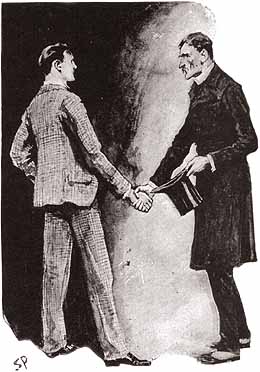“ ‘Undoubtedly so. But you will find that all I say is really to the point. I have a professional commission for you, but absolute secrecy is quite essential – absolute secrecy, you understand, and of course we may expect that more from a man who is alone than from one who lives in the bosom of his family.’ | 「『もちろんその通りです◆しかし私が言う事は非常に的を射ていると分かるでしょう◆私はあなたに依頼したい仕事を持っています / しかし完全な秘密が極めて不可欠なのです / / 完全な秘密は / お分かりのように / もちろん / 我々は期待できる / 一人でいる男の方が / 親しい家族と住んでいる人間よりも』」 |
“ ‘If I promise to keep a secret,’ said I, ‘you may absolutely depend upon my doing so.’ | 「『秘密をお約束すれば』 / 私は言いました / 『私は約束を守ると完全に信頼していただいて構いません』」 |
“He looked very hard at me as I spoke, and it seemed to me that I had never seen so suspicious and questioning an eye. | 「彼は私が言っているとき非常に鋭く私を睨みつけ / 私には思えました / これほど疑わしく訝るような目つきは見た事がないと」 |
“ ‘Do you promise, then?’ said he at last. | 「『ではお約束いただけるのですな?』 / 遂に彼は言いました」 |
“ ‘Yes, I promise.’ | 「『ええ、お約束します』」 |
 | |
“ ‘Absolute and complete silence before, during, and after? No reference to the matter at all, either in word or writing?’ | 「『絶対に完全な沈黙ですぞ / 仕事の前も / 仕事中も / その後も? / この件について全く言及しないこと / しゃべっても書いてもいけない?』」 |
“ ‘I have already given you my word.’ | 「『すでにそう言っていますが』」 |
“ ‘Very good.’ He suddenly sprang up, and darting like lightning across the room he flung open the door. The passage outside was empty. | 「『いいでしょう』 / 彼は突然パッと立ち上がり / 稲光のように部屋を走り / 扉をさっと開けました◆外の通路には誰もいませんでした」 |
“ ‘That’s all right,’ said he, coming back. ‘I know the clerks are sometimes curious as to their master’s affairs. Now we can talk in safety.’ He drew up his chair very close to mine and began to stare at me again with the same questioning and thoughtful look. | 「『よし、大丈夫だ』 / 彼は言いました / 戻ってきながら◆『職員は往々にして主人の出来事に興味があるものだということは知っていますので◆これで安心して話ができます 』 / 彼は自分の椅子を私の椅子に非常に近づけ / また私をじろじろと見ました / 先ほどのように疑わしそうな何か考えているような目で」 |
“A feeling of repulsion, and of something akin to fear had begun to rise within me at the strange antics of this fleshless man. Even my dread of losing a client could not restrain me from showing my impatience. | 「嫌な気分と / ちょっと恐ろしいような気分が / 私の中で沸き始めました / このガリガリの男の妙な行動で◆顧客を失うという恐れでさえ / 私がイライラした気持ちを表すのを抑制させることは出来ませんでした」 |
“ ‘I beg that you will state your business, sir,’ said I; ‘my time is of value.’ Heaven forgive me for that last sentence, but the words came to my lips. | 「『仕事のお話をしていただけますか』 / 私は言いました / 『私の時間は貴重なのです』 / 最後の言葉はまずかったと思いますが / つい口から出てしまいました」 |
“ ‘How would fifty guineas for a night’s work suit you?’ he asked. | 「『一晩の仕事で50ギニーではいかがかな?』 / 彼は尋ねた」 |
“ ‘Most admirably.’ | 「『最高です』」 |
“ ‘I say a night’s work, but an hour’s would be nearer the mark. I simply want your opinion about a hydraulic stamping machine which has got out of gear. If you show us what is wrong we shall soon set it right ourselves. What do you think of such a commission as that?’ | 「『私は一晩と言ったが / しかし一時間と言う方が正確でしょう◆私は単純に意見を伺いたいだけです / 水圧の圧縮装置について / 調子が悪くなった◆もし何が悪いかおっしゃってもらえれば / 自分達でそれを直します◆こういう依頼についてどう思いますかな?』」 |
“ ‘The work appears to be light and the pay munificent.’ | 「『仕事は簡単で報酬は非常に気前がよいもののようですですね』」 |
“ ‘Precisely so. We shall want you to come to-night by the last train.’ | 「『まさにその通り◆今夜の最終列車で来て頂きたい』」 |
“ ‘Where to?’ | 「『どこへ?』」 |
“ ‘To Eyford, in Berkshire. It is a little place near the borders of Oxfordshire, and within seven miles of Reading. There is a train from Paddington which would bring you there at about 11:15.’ | 「『バークシャーのアイフォードです◆オックスフォードシャーの州境の小さな場所です / レディングから七マイル以内にあります◆パディントン駅発の列車があります / それに乗ると11時15分頃には着けるでしょう』」 |
“ ‘Very good.’ | 「『結構です』」 |
“ ‘I shall come down in a carriage to meet you.’ | 「『馬車で迎えに行きますので』」 |
“ ‘There is a drive, then?’ | 「『では馬車で移動するのですか?』」 |
“ ‘Yes, our little place is quite out in the country. It is a good seven miles from Eyford Station.’ | 「『そうです / 我々のちょっとした場所はかなり郊外にありまして◆アイフォード駅からたっぷり七マイルはあります』」 |
“ ‘Then we can hardly get there before midnight. I suppose there would be no chance of a train back. I should be compelled to stop the night.’ | 「『それだと十二時前に着くのは難しいですね◆列車で戻ることは無理だと思います◆その晩は泊まらないといけなくなります』」 |
“ ‘Yes, we could easily give you a shake-down.’ | 「『ええ / 仮眠ベッドは簡単に提供できます』」 |
“ ‘That is very awkward. Could I not come at some more convenient hour?’ | 「『それは面倒ですね◆もっと便利な時刻にお邪魔する事はできませんか?』」 |
“ ‘We have judged it best that you should come late. It is to recompense you for any inconvenience that we are paying to you, a young and unknown man, a fee which would buy an opinion from the very heads of your profession. Still, of course, if you would like to draw out of the business, there is plenty of time to do so.’ | 「『あなたに夜遅く来ていただくのが一番だと判断したのです◆あらゆる不便を償うために / 私達があなたに支払うつもりです / 若くて無名の人物に / この仕事の超一流の人から意見を伺えるほどの金額を◆それでも / もちろん / この仕事から手を引きたいというのでしたら / 考え直す時間は十分あります』」 |
“I thought of the fifty guineas, and of how very useful they would be to me. ‘Not at all,’ said I, ‘I shall be very happy to accommodate myself to your wishes. I should like, however, to understand a little more clearly what it is that you wish me to do.’ | 「私は50ギニーを考えてみました / それが自分にどれだけ役立つかを◆『いいえ』 / 私は言いました / 『喜んであなたのご希望に添うようにしましょう◆ですが、できれば / 私に依頼したいことについて、もう少しはっきりと理解したいのですが』」 |